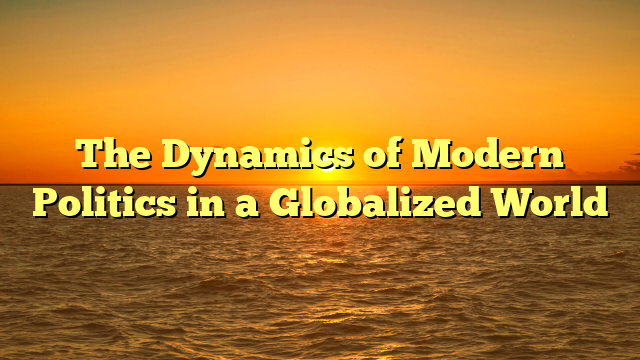Politics has always been at the heart of human civilization. From the earliest forms of governance in ancient city-states to today’s complex democracies and authoritarian regimes, politics shapes the way societies function, resolve conflicts, and allocate resources. In the modern era, politics has become even more dynamic due to globalization, rapid technological advancement, and the growing influence of public opinion. Understanding these dynamics is crucial in order diponegoro4d to navigate the challenges of the present and the future.
One of the most striking features of modern politics is its interconnectedness. No country exists in complete isolation, and decisions made by one government often have repercussions beyond its borders. International trade agreements, climate policies, and even domestic elections can influence global markets and international relations. For instance, a shift in U.S. foreign policy can affect the economic strategies of European nations, or environmental regulations in the European Union can pressure other regions to adopt similar standards. This interconnectedness highlights the necessity of diplomacy and cooperation in maintaining global stability.
Democracy remains a central political model in many nations, yet it faces significant challenges in today’s world. While democratic systems provide citizens with the right to vote, freedom of expression, and political representation, they are increasingly tested by polarization, populism, and misinformation. The rise of social media has amplified these issues, as digital platforms have become both a space for civic engagement and a tool for spreading disinformation. This dual role has forced governments to consider new policies regulating online platforms while balancing the protection of free speech.
At the same time, authoritarian regimes continue to exert influence on the global stage. Countries led by strong centralized governments often argue that their systems provide stability and rapid decision-making compared to the slower processes of democracy. However, such regimes are frequently criticized for suppressing dissent, restricting freedoms, and limiting political participation. The global political landscape today reflects a competition between these two models, with some nations moving toward democratic reforms and others tightening authoritarian control.
Another important dimension of modern politics is the growing role of non-state actors. Multinational corporations, international organizations, and grassroots movements now play an increasingly important part in shaping policy. Companies like technology giants can influence national security discussions, while organizations such as the United Nations and the World Health Organization coordinate responses to global challenges like pandemics and climate change. Meanwhile, social movements, often initiated by young people, demand action on issues like racial justice, gender equality, and environmental sustainability. This demonstrates how power in politics is no longer confined solely to governments.
In addition, political decision-making is deeply intertwined with economic and social concerns. The wealth gap, migration crises, and healthcare inequalities are not just social issues but also political ones that demand government attention. For example, debates on taxation, welfare policies, and immigration laws reveal how politics serves as the arena where competing interests and values collide. The ability of leaders to find compromise and build consensus is essential to maintaining both national unity and international cooperation.
Looking forward, the future of politics will likely be defined by how effectively nations adapt to rapid change. Climate change, artificial intelligence, and global security threats require collective solutions that transcend borders. Politicians who cling to narrow, short-term agendas risk falling behind, while those who embrace innovation and global collaboration may set the course for progress.
In conclusion, politics today is more complex and interconnected than ever before. It is a sphere where domestic concerns meet international realities, where democracy contends with authoritarianism, and where governments share the stage with corporations and grassroots movements. As challenges continue to evolve, the effectiveness of political systems will depend on their ability to balance power, promote fairness, and adapt to a rapidly changing world.
